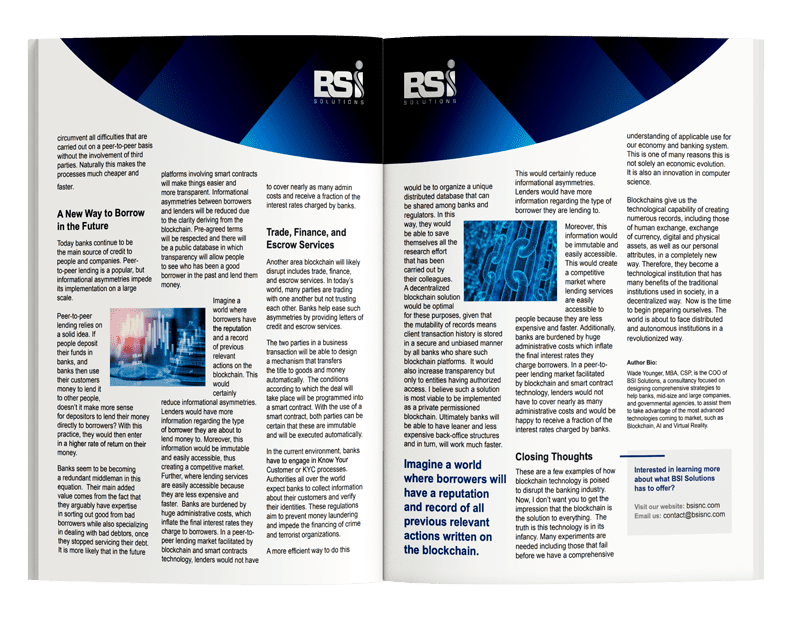by Wade Younger, Chief Operating Officer, BSI Solutions, Inc.
Economists have been exploring human behavior for hundreds of years, including how we make decisions, how we act individually, and in groups. Furthermore, how we exchange value is studied within the institutions that facilitate trades like legal systems, corporations, and marketplaces. Now, there is a new technological institution that will fundamentally change how we exchange value, and it is called the blockchain.
I want you to remember that despite blockchain technology being relatively new, it’s also a continuation of a very human story.
We are now entering a radical evolution of interaction. For the first time, we can lower uncertainty. Not only political uncertainty and economic institutions, like our banks, corporations, and governments, but we can do it with technology alone.
Blockchain technology is a decentralized database that houses a registry of assets and transactions across a peer-topeer network. Essentially, it is a public registry that owns what and who can transact what. The transactions are secure, and, over time, the transaction history gets locked in blocks of data. These blocks are cryptographically linked together and secured to create immutable records of all the transactions.
The world has seen several innovations that have radically transformed the way economic value was created and captured by individuals and companies. Blockchain is another step in the evolution of technology and especially in banking.
Speaking of the continuation of a very human story, 30 years ago, the Internet came to the stage. It took less than a decade for the masses to adopt it as a general purpose technology. From its humble beginnings as a military application, the internet has become commonplace. Without a thought we “go online” to pay bills, shop, order food, take classes, and much more.
If you need further proof of how our world has changed, think back to the company Blockbuster. Blockbuster was the world’s largest video rental company but failure to adapt to a changing world sent them into bankruptcy. Their direct competitor, Netflix, saw an opportunity and they seized it. By offering to mail-order video rental and eventually streaming, they built a business model that far outpaced the industry giant. Despite having hundreds of brick-and-mortar storefronts, they moved too late in embracing the new opportunity and adjusting their business model. Examples of industries that have been completely reshaped by the Internet are countless. The companies that manage to win big are the ones that embrace the new technology and built their business models around it.
Why am I saying all this in the context of blockchain? Well, I want to help you envision how immensely impactful blockchain will have on the banking industry
The Financial Disruption
The advent of cryptocurrencies and blockchain technologies provides a way to build and expand on the traditional banking model. After the cryptocurrency boom of 2017, with consideration of the immense amount of capital research and development pouring into cryptocurrencies and blockchain technology, it would not be an exaggeration to say that Silicon Valley and tech startups are advancing at full speed. This impact has led the banking industry to be the first to feel such force. You may be asking yourself:
“Why should the banking industry change?”
After all, the primitive banking business model has been valid for hundreds of years. It has weathered socioeconomic changes, political changes, and advent of the various technologies. This is all true, but the industry has also been stagnant for quite some time. The existing status quo is soon to be disrupted by the blockchain technology known as the “Internet of money.” This is not a question of if, but more a question of when and how.
What is the internet of money? Simply, it is a decentralized financial system, working to change the industry through the use of digital currencies and decentralized ledgers. With this system, buyers and sellers are allowed to interact directly, anonymously, as well as with a high degree of speed.
Traditional bank business operations revolve around deposit making and credit giving. If people were to stop depositing their funds and bank deposits decreased, commercial banks would not be able to finance the loans they give to borrowers at a decreased rate. Hence, traditional banks’ entire business model would become outdated and obsolete.
It would be like trying to sell videotapes and old school film cameras in the world of online video streaming, digital cameras, smartphones, or using homing pigeons in the age of instant messaging.
Why would we expect fewer people to deposit their money in traditional banks in the future? Until now, there have been very few places where people could store their money. Options were to keep it at home, in their mattresses, storage bins, or jars filled with banknotes buried in the garden, or simply deposit funds in the bank where the money would be safer than at home, provided the bank doesn’t go bust of course.
Fintech, Blockchain, and Banking Today
Fintech is a blended term that refers to financial technology, a sector that includes any tech used in the financial services industry. Among the first things that come to mind are online payment systems like PayPal, Venmo, ApplePay, Transferwise, and Payoneer. Fintech is here and blockchain is leading the way.
The advent of Bitcoin and cryptocurrencies, in general, gives people a viable fintech alternative. Blockchain enables secure payments and store of(?) value without third-party interference. Digital money stored within the blockchain will continue to remain there, and no one can take it away if stored privately and properly. Therefore, banks are not the only option for storing your funds anymore. The clearest evidence that people consider cryptocurrencies as a viable alternative comes from countries suffering hyperinflation like the recent examples with Zimbabwe and Venezuela. In this instance, the price of Bitcoin skyrocketed and held a substantial premium over the rest of the world.
Launching blockchain solutions circumvent all difficulties that are carried out on a peer-to-peer basis without the involvement of third parties. Naturally this makes the processes much cheaper and faster.
A New Way to Borrow in the Future
Today banks continue to be the main source of credit to people and companies. Peer-to-peer lending is a popular, but informational asymmetries impede its implementation on a large scale.
Peer-to-peer lending relies on a solid idea. If people deposit their funds in banks, and banks then use their customers money to lend it to other people, doesn’t it make more sense for depositors to lend their money directly to borrowers? With this practice, they would then enter in a higher rate of return on their money.
Banks seem to be becoming a redundant middleman in this equation. Their main added value comes from the fact that they arguably have expertise in sorting out good from bad borrowers while also specializing in dealing with bad debtors, once they stopped servicing their debt. It is more likely that in the future platforms involving smart contracts will make things easier and more transparent. Informational asymmetries between borrowers and lenders will be reduced due to the clarity deriving from the blockchain. Pre-agreed terms will be respected and there will be a public database in which transparency will allow people to see who has been a good borrower in the past and lend them money.
Imagine a world where borrowers have the reputation and a record of previous relevant actions on the blockchain. This would certainly reduce informational asymmetries. Lenders would have more information regarding the type of borrower they are about to lend money to. Moreover, this information would be immutable and easily accessible, thus creating a competitive market. Further, where lending services are easily accessible because they are less expensive and faster. Banks are burdened by huge administrative costs, which inflate the final interest rates they charge to borrowers. In a peer-to-peer lending market facilitated by blockchain and smart contracts technology, lenders would not have to cover nearly as many admin costs and receive a fraction of the interest rates charged by banks.
Trade, Finance, and Escrow Services
Another area blockchain will likely disrupt includes trade, finance, and escrow services. In today’s world, many parties are trading with one another but not trusting each other. Banks help ease such asymmetries by providing letters of credit and escrow services.
The two parties in a business transaction will be able to design a mechanism that transfers the title to goods and money automatically. The conditions according to which the deal will take place will be programmed into a smart contract. With the use of a smart contract, both parties can be certain that these are immutable and will be executed automatically.
In the current environment, banks have to engage in Know Your Customer or KYC processes. Authorities all over the world expect banks to collect information about their customers and verify their identities. These regulations aim to prevent money laundering and impede the financing of crime and terrorist organizations.
A more efficient way to do this would be to organize a unique distributed database that can be shared among banks and regulators. In this way, they would be able to save themselves all the research effort that has been carried out by their colleagues. A decentralized blockchain solution would be optimal for these purposes, given that the mutability of records means client transaction history is stored in a secure and unbiased manner by all banks who share such blockchain platforms. It would also increase transparency but only to entities having authorized access. I believe such a solution is most viable to be implemented as a private permissioned blockchain. Ultimately banks will be able to have leaner and less expensive back-office structures and in turn, will work much faster.
Imagine a world where borrowers will have a reputation and record of all previous relevant actions written on the blockchain.
This would certainly reduce informational asymmetries. Lenders would have more information regarding the type of borrower they are lending to. Moreover, this information would be immutable and easily accessible. This would create a competitive market where lending services are easily accessible to people because they are less expensive and faster. Additionally, banks are burdened by huge administrative costs which inflate the final interest rates they charge borrowers. In a peer-to-peer lending market facilitated by blockchain and smart contract technology, lenders would not have to cover nearly as many administrative costs and would be happy to receive a fraction of the interest rates charged by banks.
Closing Thoughts
These are a few examples of how blockchain technology is poised to disrupt the banking industry. Now, I don’t want you to get the impression that the blockchain is the solution to everything. The truth is this technology is in its infancy. Many experiments are needed including those that fail before we have a comprehensive understanding of applicable use for our economy and banking system. This is one of many reasons this is not solely an economic evolution. It is also an innovation in computer science.
Blockchains give us the technological capability of creating numerous records, including those of human exchange, exchange of currency, digital and physical assets, as well as our personal attributes, in a completely new way. Therefore, they become a technological institution that has many benefits of the traditional institutions used in society, in a decentralized way. Now is the time to begin preparing ourselves. The world is about to face distributed and autonomous institutions in a revolutionized way.



Wade Younger
Chief Operating Officer, BSI Solutions, Inc.
Wade Younger, MBA, CSP, is the COO of BSI Solutions, a consultancy focused on designing comprehensive strategies to help banks, mid-size and large companies, and governmental agencies, to assist them to take advantage of the most advanced technologies coming to market, such as Blockchain, AI and Virtual Reality.
Interested in learning more about what BSI Solutions has to offer?
Visit our website: bsisnc.com
Email us:
